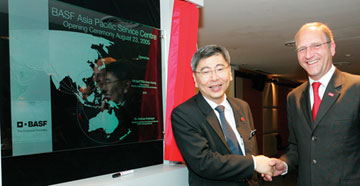SOUTHEAST ASIA
Many Tongues in Malaysia
In August 2005, German multinational BASF announced it would invest more than US$25 million in a regional shared services center in Kuala Lumpur, Malaysia, uniting support services in finance and accounting,
 |
| Dr. Andreas Kreimeyer, Member of the Executive Board of Directors of BASF Aktiengesselschaft and Dato' Mah Siew Keong, Deputy Minister of International Trade and Industry, Malaysia, shake hands at the opening ceremony of the BASF Asia Pacific Service Centre in Kuala Lumpur, Malaysia. The adjacent map shows the reach of the shared service center into 53 different BASF organizations in 15 Asia Pacific countries. |
"Malaysia was chosen as the location for our regional service center due to the availability of skilled staff with business and language skills — most importantly Chinese, Korean and Japanese — and its stable and competitive economic environment," said Dr. Andreas Kreimeyer, member of the Board of Executive Directors of BASF Aktiengesellschaft responsible for Asia.
The project is not alone: By the end of 2005, BASF expected to have fully staffed a similar shared service center in eastern Berlin. Expected to create between 500 and 600 jobs, that center will integrate services that had been administered by more than 100 local BASF subsidiaries across Europe.
"Interestingly, the rents we pay in Berlin are approximately the same as we pay in Malaysia," says Thomas Glatte, head of corporate real estate management, BASF Group, in an interview with Site Selection. "We were extremely surprised to see the attractive bargains you can get in Berlin."
Glatte says the process for choosing Kuala Lumpur began in 2003 with many countries on the table, but multilingual capability was ultimately the deciding factor besides typical factors like labor costs and rental fees.
"We wanted to have not only English, but Chinese, Korean, Japanese and Thai," says Glatte. "Malaysia was the only one to offer that wide range."
Glatte says the typical locations scouted for any sort of outsourced function include Bombay and Bangalore, Kuala Lumpur, Thailand, Manila and Shanghai and Dalian in China. However, he says, even though popular Dalian may offer accountants that work for 40 percent of the pay in Shanghai, it never made the list because of its limited command of English.
The short list came down to four locations. In addition to the major driver of cost, says Glatte, qualitative criteria for the SSC included local recruiting potential, living environment, labor laws and stable communications infrastructure. "Also, at the start we had a few expats, but at the end we did not want a lot of expats," says Glatte.
Glatte adds that last place from a property perspective on the scouted site list ended up going to Shanghai, where office rental prices have approached those of Hong Kong or Tokyo, and where attracting multilingual skills requires locating in expensive space at prime locations. The real estate cost goes down in the Shanghai suburbs, but the availability of qualified staff does too. As of today, says Glatte, the native Chinese population in Malaysia runs between 30 percent and 35 percent.
Similar challenges exist in India now, where office rents in Bombay are rising fast, and where language capabilities beyond English are not that easy to find.
Proximity to the existing support functions of BASF was important too, says Glatte, so that the existing IT network can be used to get the SSC up and running quickly. Plus, he says, the people already in place understand the local labor laws. With the help of Accenture in evaluating and implementing the project, the BASF team made its decision in mid-2004.

